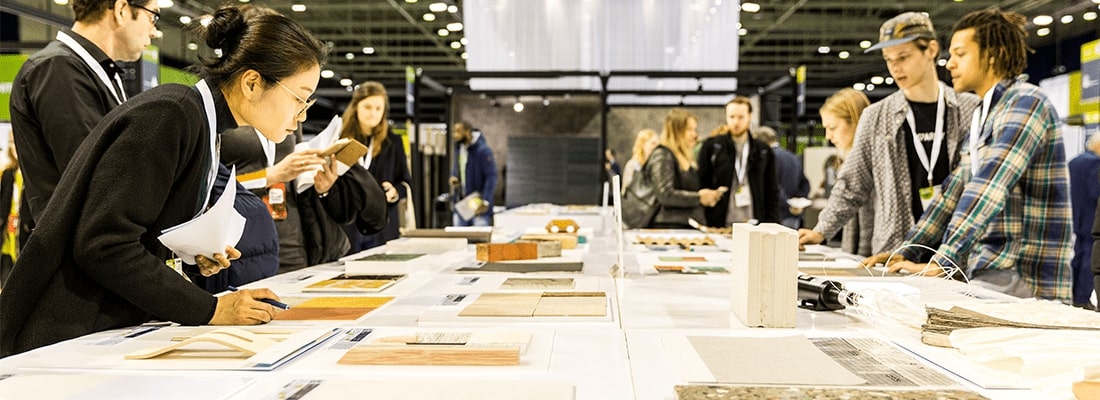MaterialDistrict (formerly Materia) is the world’s leading match-making platform in the field of innovative materials. As part of the Construction Material Pavilion (CMP) at METSTRADE, MaterialDistrict showcases innovative materials for the maritime industry. Their goal is to inspire marine architects, designers, and boatbuilders with innovative and experimental materials that can be used in the construction of yachts and boats. Apart from their participation at METSTRADE, the MaterialDistrict team also organises pop-up shows where they can display their constantly updated and comprehensively researched range of materials sourced from all over the world.
Recently one of their shows took place in Rotterdam, where a huge and exciting range of materials were on display. During the 3-day event visitors could enjoy a very informative series of expert presentations.
Bio materials for sustainability
The subject of Sustainable or Circular Economy materials featured some interesting viewpoints from forward-thinking speakers including Els Zilstra, the Founder and Creative Director of MaterialDistrict.
“The clock is running down on time left for us to access the traditional materials which the world has taken for granted” said Els. “Within 200 years, carbon materials (oil etc.) will have expired, and for steel there is an even shorter time span until it’s exhausted!”
On the plus side, she pointed out that there is a new and rapidly growing, highly creative industry which is mopping up waste streams, and using them to produce sustainable everyday goods and construction materials.
The agricultural industry has traditionally been a high-volume waste stream source and is now providing bio based materials which can be turned into eco-friendly products. For instance, bio plastics for packaging can now be produced from the waste of cheese making. These have a 35% lower carbon footprint than petroleum based plastics and are totally biodegradable.
Naturally occurring elements such as fruit, fungus and yeast are being used to make bio based materials, including a new leather which doesn’t involve animal skin! Other natural raw material examples are algae, seaweed, starch from potatoes, fruit and vegetable leftovers, coffee grounds and even cow dung. Yes, in Italy they are actually mixing cow poo with clay, straw and other farm waste, baking it at high temperature, and producing ‘Merdacotta’, an attractive looking composite similar to terracotta.
Design for circularity
Another speaker was Martijn Vinke, director and co-owner of Triboo, a company that designs, supplies and maintains circular furniture. Martijn explained how his company makes desks, kitchens, bars, chairs, and a whole range of office space furnishings, using a variety of waste streams as the raw materials.
The products are put together without using glue or screws, and based around a construction panel called GreenGridz with similar properties to MDF. The panels are produced from natural waste fibres containing no toxic substances (MDF contains formaldehyde as a binder which is a suspected carcinogen).
When the customer buys the furniture he is assured that it will never become and end-of-life cost liability. Triboo offers a return value for their products, and simply puts the redundant furniture back through their manufacturing process to produce a new item; a truly circular concept.
Other innovative material examples
There are far too many other innovative material examples for us to cover here, but here are some examples that stood out, and could be used for yacht interiors:
Old Boat Wood Mosaic.
A very attractive decorative mosaic panel made from treated and reclaimed wood from broken up boats. Each panel is unique and durable with anti-insect and waterproof properties.
Recycled Collection.
This consists of a variety ecological interior wall panels with a raised profile as an alternative to flat panels. The collection includes three subcategories: Organic Green Recycled, Bio-Terra and Bio-Vine. The panels have a thickness of between 30mm and 50mm and come in various sizes.
Bamboo Panels.
Yokoyama Bamboo was established in 1919. They have kept the history and tradition of bamboo processing skills ever since, making a variety of products from the material including panels. The bamboo is cut down during autumn, and dyed, smoked, fireproofed, knitted or reformed in different ways to suit various applications. Bamboo is faster growing than most other trees, and is able to absorb large amounts of C02 from the atmosphere.
MaterialDistrict will be at METSTRADE again this year in the Construction Material Pavilion. Anyone with an interest in innovative sustainable materials for marine construction projects, should definitely make sure to visit their comprehensive display. But do allow yourself a few hours to see everything!

